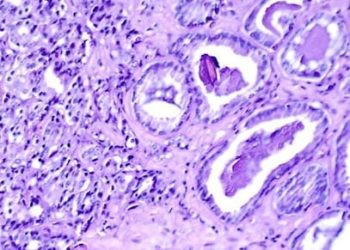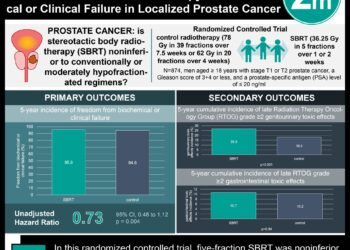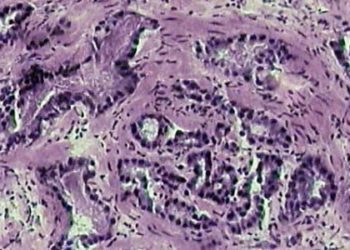Daily aspirin may not improve overall prostate cancer mortality
1. Aspirin use pre- or post-diagnosis of prostate cancer was not significant associated with a decrease in prostate-cancer specific survival.
2. Post-diagnosis daily aspirin use may be associated with increased survival in patients with high-risk prostate cancer.
Evidence Rating Level: 3 (Satisfactory)
Study Rundown: Several observational studies have suggested that aspirin use is associated with reduced prostate cancer specific mortality (PCSM), possibly via inhibition of platelet activation. However, these previous studies have not fully quantified aspirin dosing or frequency, and have had limited sample sizes. The purpose of this prospective cohort trial was to further evaluate the association between pre- and post-diagnosis daily aspirin use with PCSM among men diagnosed with non-metastatic prostate cancer.
This trial prospectively followed over 8000 men with non-metastatic prostate cancer currently on (pre-diagnosis) or starting (post-diagnosis) aspirin therapy. After a mean follow-up of 9 and 6 years for pre- and post-diagnosis respectively, the authors found that aspirin use did not have a statistically significant effect on PCSM, regardless of frequency or level of dosing. However, sub-group analysis demonstrated that post-diagnosis daily aspirin use was associated with lower PCSM among men with high-risk prostate cancer (>T3 and/or Gleason score >8). Interestingly, the protective effect observed was independent of aspirin dosage in the high-risk group. The strengths of this trial were the large sample size and the long period of follow-up. The results of this trial suggest a potential benefit in men with high-risk prostate cancer only; however, additional randomized control trials are required to determine causality of this association.
Click to read the study in Journal of Clinical Oncology
Relevant Reading: Aspirin use after a prostate cancer diagnosis and cancer survival in a prospective cohort
In-Depth [prospective cohort]: The authors of this study identified and ultimately included a total of 8427 men with non-metastatic prostate cancer from the Cancer Prevention Study (CPS)-II Nutrition Cohort. Low-risk prostate cancers were defined as clinical T1-T2 and Gleason score <7, with high risk defined as T>3 or Gleason >8. Information on aspirin dosing (low dose typically 81mg) and frequency of use was reported at enrollment, then on serial follow-up questionnaires every 2 years. The major outcome was prostate cancer-specific mortality (PCSM). Pre-diagnosis daily aspirin use was not significantly associated with PCSM during a mean follow-up of 9.3 years (HR: 0.92; 95% CI: 0.72-1.17), nor was post-diagnosis daily aspirin use during a mean follow-up of 6.4 years (HR: 0.98; 95% CI: 0.74-1.29). PCSM in high-risk prostate cancer was reduced with daily aspirin use (HR: 0.6; 95% CI: 0.37-0.97) with no relationship to dosing (low dose: HR 0.5; 95% CI: 0.27-0.92; high dose: HR 0.73; 95% CI 0.4-1.34).
More from this author: Rituximab linked with reduced chronic immune disease following stem cell transplantation, High-dose prophylaxis for hemophilia increases costs with minimal benefit, Ambrisentan found ineffective against idiopathic pulmonary fibrosis
Image: PD
©2012-2014 2minutemedicine.com. All rights reserved. No works may be reproduced without expressed written consent from 2minutemedicine.com. Disclaimer: We present factual information directly from peer reviewed medical journals. No post should be construed as medical advice and is not intended as such by the authors, editors, staff or by 2minutemedicine.com. PLEASE SEE A HEALTHCARE PROVIDER IN YOUR AREA IF YOU SEEK MEDICAL ADVICE OF ANY SORT.







